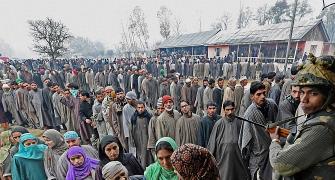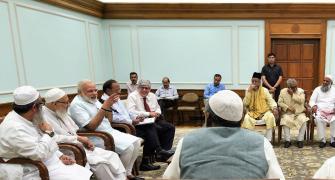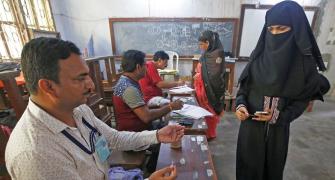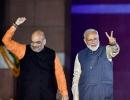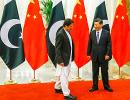'What are the circumstances at that time? Had you thought Modi will come after Vajpayee?'
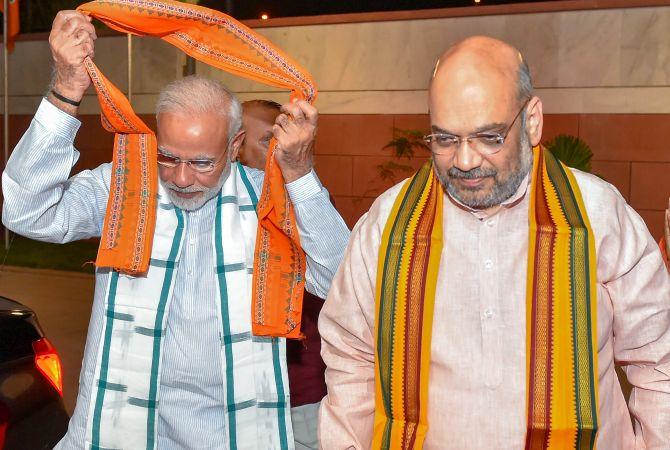
"Making well-planned decisions and executing them perfectly is the speciality of both Narendra Modi and Amit Shah," former Uttar Pradesh governor Ram Naik, a veteran Bharatiya Janata Party parliamentarian and former Union minister, tells Rediff.com's Prasanna D Zore in the second segment of a three-part interview.
Do you think the revocation of Article 370, triple talaq, implementation of the NRC would have been possible without Prime Minister Narendra Modi and Amit Shah as the home minister? Both are considered strong-willed leaders.
They are committed to the BJP's core ideology and not only make well-planned decisions but execute the plans too with finesse.
So, this (revocation of Article) 370 is a very important decision and will have very positive impact in Jammu and Kashmir. Entire India accepted it, accepted with joy. Similarly, for triple talaq; by and large all Indians were happy.
So making well-planned decisions and executing them perfectly is the speciality of both Narendra Modi and Amit Shah.
How do you think the Kashmir valley will react once this communication blockade is lifted? Do you think the Indian Army will have to face lot of hardships in dealing with the protests that many believe will pour once the communication blockade is lifted?
As children we learned that Kashmir Bharat ka nandanvan hai (Kashmir is India's paradise). Kashmir will emerge as the most popular destination for tourists. That will help boost the economic condition of the people of Jammu and Kashmir.
Given the alienation of the people there, a lot of reports are coming out that people are very angry about revocation of Article 370. Do you think such a paradise will welcome tourists from other Indian states?
Indian tourists will definitely be welcomed and it (the situation in Kashmir) will take some time for normalisation.
But in the last one month, the home minister has gone on record that not a single bullet has been fired in the valley, so this so-called alienation which is being reported will go away.
Also remember that because of the revocation of Article 370, people of Jammu and Ladakh have also started feeling closer to India.
Do you think Amit Shah will one day step into Prime Minister Modi's shoes?
These decisions are taken by the party. What are the circumstances at that time? Had you thought Narendra Modi will come after Vajpayee at that time? The BJP has no dearth of stalwarts.
Even now, if you look at some of the comparatively young ministers, the way they have been working, there's no dearth of the young leadership in the BJP.
Naturally, if that is done, the BJP will get the (electoral) benefit.
Who are the ministers that have impressed you with their work?
Let me give you some names from Maharashtra. Take Mr (Nitin) Gadkari (Union minister of roads and surface transport). He has been an outstanding minister and he also had been the party president once.
Look at Prakash Javdekar (Union minister of information & broadcasting and forest, environment and climate change)! Look at Piyush Goyal (Union minister of commerce, industry and railways) and his work!
All across India, the BJP has strong leaders who have had lot of experience as chief ministers in different states. So there is no dearth of good leaders who have solid experience of governance as well as organising the party.
So, this indicates that we are a strong organisation all over India and that will bring out able leaders and statesmen.
Critics are saying that the Modi government has lost the economic plot completely. Nobody's talking about 2014 slogans like 'achche din' and 'vikas' How do you reply to such critics?
Whoever is saying this has no idea of what is happening at the ground level. If what they are saying would have been the people's voice, people would not have elected Mr Modi with such a big number.
So those who feel like that, probably they should check themselves as to what they were saying has reflected in the election and if you say that people who voted the BJP with such big numbers don't understand that then it means that you don't understand democracy.
That is democracy, but this is economics. People are losing their jobs, factories are being shut down, consumption demand has vanished.
Critics are using this situation in India as an economic slowdown but in America and other developed economies people are calling their economic condition as recession. If those countries are facing recession then here is a natural corollary of what is happening globally.
The drone attack on Saudi oilfields led to a sharp rise in crude prices and when that happens countries like India feel the impact of such sudden spikes.
The things have changed and the interdependence of economies is very important. And when these developed countries are facing a recession, naturally there's going to be an impact on other economies also.
Again, to give you the same example of 2008-2009, the recession was far more severe and at that time also the global economies were interconnected, but, India under Dr Manmohan Singh's leadership went through the recession much more comfortably than they are doing now.
You should not compare how the people reacted then to how people are reacting now. At that time, there was not much social media and now the way people express themselves has undergone huge change. You have to look at how the BJP is handling the situation.
The ministers of this government are wise enough to understand what is happening and so the finance minister has only yesterday (the interview was recorded on September 21) declared certain concessions and industries and manufacturing can be revived.
One wonders why the government couldn't take this decision when the finance minister announced the Union Budget for 2019-20? Why waste three months in bringing about as solid a reform as a cut in corporate income tax?
People who sit in glass offices only think like this. They don't understand how things work (at the ground level).
Now let us talk about your most recent post. How was your experience as the governor of India's most populous state, Uttar Pradesh? And how was your relationship with UP Chief Minister Yogi Adityanath?
If I had to summarise what has happened in the last five years, after I took the oath, press people asked me about my agenda. I said, I have three things in mind: The first is the request that people should not call me 'His Excellency', but could address the governor as 'honourable'.
So I issued the notification next day that no one should address me as 'His Excellency'.
I said I will convert Uttar Pradesh into Uttam Pradesh despite the challenges of being the most populous state in India. The last plan was to improve the standard of higher education in UP.
Out of these three things, when I completed five years of my tenure the state of higher education in the state has improved tremendously.
Since 1978, as a measure of accountability, I have been producing an annual report that talks about my work as a matter of accountability, honesty and integrity towards the voters.
As an MLA I would publish this annual reports as 'Vidhan Sabha main Ram Naik (The performance of Ram Naik in the Vidhan Sabha); when I went to the Lok Sabha, I would publish 'Lok Sabha main Ram Naik (The performance of Ram Naik in the Lok Sabha) and after I became the governor of Uttar Pradesh every year I would publish 'Raj Bhavan main Ram Naik'. When I was not an elected representative, I would still come out with a report 'Lok seva main Ram Naik'.
For 40 years, I have been publishing these annual reports and you will get to know all the good work I have done for the people here.
I met Yogi Adityanath 26 times in one year. I had good relations with Yogi. I had good relations with Akhilesh Yadav (the UP chief minister before Yogi Adityanath) also, but on issues naturally we had had our differences.
There were two occasions when the issue of Constitutional propriety arose and I followed the Constitution and prevailed.
Akhilesh Yadav, being the chief minister, has the right to nominate members to the state's legislative council and once he sent me a list of nine people for nomination.
Out of the nine, four nominations belonged to people who had been sentenced to jail for more than two years.
When I refused to nominate them to the legislative council, there was havoc.
I am the first person (governor) who said no to such nominations and prevailed upon him to send me fresh names of people without a criminal background. He did send a new list and I nominated them then.
Another incident was when Akhilesh Yadav brought in an amendment to the Lokayukta law to increase the tenure of the Lokayukta (anti-corruption ombudsman) from five years to ten years, but the Act says the name and tenure of the new Lokayukta should be unanimously approved by the chief minister, chief justice and the leader of the Opposition in the state.
There was no agreement on the name suggested by Akhilesh Yadav as the chief justice of the Allahabad high court had complaints against the nominated person's character and style of working.
Akhilesh's contention was that majority should rule, but I dismissed the suggestion saying that I will not sign the file unless the Lokayukta's name was unanimously accepted by all the three.
That file was tossed five times between me and him and the issue finally went to the Supreme Court where my view was upheld.
Compared to Yadav, Yogi's attitude has been very positive. UP, which had been the worst performer on the law and order front when Yogi took over, saw a huge change as the latter took stringent action against organised crime. Because of this action against organised crime, when Uttar Pradesh had an investors' meet, the state got proposals worth Rs 4.68 lakh crore.
This happened because UP now has energy for 24 hours; law and order has improved tremendously. From that point of view, investments in the state have increased and that is achievement number one.
During the Kumbh Mela, 25 crore people visited the mela without any incident. The chief minister was praised for his organisation by even tourists who came from abroad.
As the chairman of the committee that oversaw the Kumbh Mela, I suggested that the name of Allahabad should be changed to Prayagraj, which Adityanath accepted. Later, Faizabad was also changed to Ayodhya. On different fronts, Adityanath is performing well.

